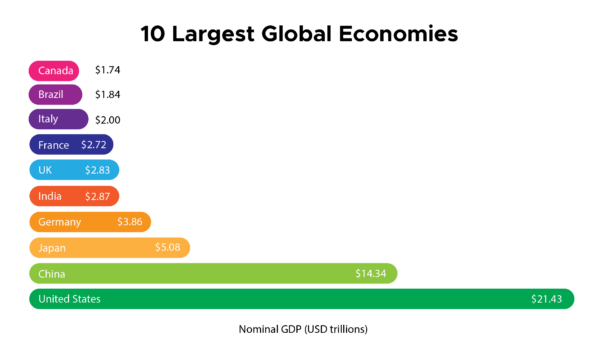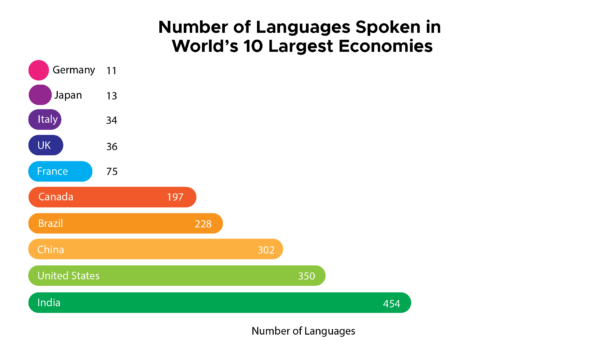Multilingual content for your global market
According to the International Monetary Fund (IMF), the global economy currently rings in at USD 93.8 trillion and ‘is projected to grow 6.0 percent in 2021 and 4.9 percent in 2022’.1 As the world becomes increasingly more globalised, capital must flow across countries. But capital flow doesn’t happen in a vacuum. It requires continued, effective communication across languages and cultures, making a strong case for investment in business translation services.
When we consider the world’s 10 largest global economies alone, hundreds of languages are spoken. Any business hoping to thrive in the global marketplace, therefore, requires a truly international presence that reaches across boundaries and jurisdictions. Business translation services can help with that.
Data Source/s: Investopedia, IMF, US Census Bureau, World Population Overview, World Atlas, Babbel
The world is your oyster with business translation services
Large or small, multinational or domestic, there is a tremendous variety of companies in the financial services sector that stand to benefit from business translation services. Take HSBC, the sixth-largest bank in the world with almost USD 3 trillion in total assets as of 2020. HSBC famously positioned itself as ‘the world’s local bank’ for a decade before retiring the tagline after the global financial crisis. Despite this, the slogan still echoes around the marketplace even today and it’s not hard to see why. Serving over 40 million clients in 64 countries, HSBC truly commands an international presence with immense name recognition across the globe. With ‘the world’s local bank’, they sought to marry their global scope with a more personable touch, speaking directly to the individual consumer. This brand strategy lives on in the bank’s stated purpose today opening up a world of opportunity. With a mandate that quite literally promises the entire world, it’s not hard to see how business translation services could prove vital to a large banking corporation like HSBC.
It’s not just major banks, however, that stand to benefit from business translation services. AIA is a multinational insurance corporation that is ‘100% focused on Asia-Pacific, with a presence in 18 markets across the region’.2 AIA’s total assets ring in at USD 284 billion as of 31 December 2019 as the bank proudly narrows in its focus on the APAC market. Although AIA is a mere fraction of HSBC in both size and scope, business translation services are just as important to a company like AIA as they are to a banking giant like HSBC.
Asia-Pacific is one of the most linguistically diverse regions in the world, with approximately 2,300 languages spoken across its 4.5 billion inhabitants. That’s 35% of the world’s total languages spoken by 60% of its population. To maximise the share of this vast marketplace, business translation services are vital for insurance companies like AIA. Translating marketing collateral alone, for instance, can help to increase the number of clients. It can also help to increase the average transaction size and even increase the frequency of transactions per customer. And, localising job descriptions will help companies like AIA attract an ethnically and linguistically diverse talent pool. In other words, it just makes good business sense to operate in the target region’s local language.
The case for business translation services
There are many use cases for how business translation services can benefit companies in the financial sector both internally and externally. Through the translation of marketing materials, for instance, companies will be better able to reach a new demographic or expand their offerings to other far-reaching markets. Business translation services can also enhance an e-learning course or presentation slides requiring distribution in multiple regions for vital internal training. Public-facing documents — such as quarterly results announcements or investor relations materials — can also be translated to reach a wider audience. And let’s not forget about the translation of legal and compliance documents which can prove crucial when setting up new funds or offices overseas.
There are also use cases for other types of business language services that are tangential in nature, yet still related. Imagine you’re a large multinational corporation needing to present important internal updates to staff based in multiple countries. Or perhaps you’re conducting an online investor day and expecting a sizable contingent of attendees from non-English speaking countries. In each case, engaging remote interpreting or live captioning services add value by improving accessibility for those who are not proficient in the event language. On a smaller scale, imagine conducting an in-person HR meeting with an employee who has only a limited grasp of English. Having an interpreter in attendance would bring peace of mind to your employee and ensure that your points are well understood, minimising the risk of miscommunication.
Business translation services best practice for the financial sector
We’ve heard how business translation services are important right across the financial sector, from global banking giants and insurance institutions to investment funds and trading houses. But the sheer variety of companies, services, and products make it near impossible to take a one-size-fits-all approach to translation in this sector. Here are some tips for getting the most out of your financial services translation.
- Use the right translator for the job — Anyone who has viewed a financial results presentation or dealt with investment fund documentation will know that financial terminology is often complex and obtuse. To make matters even worse, there are significant differences in the financial jargon used across the sector. Key metrics on the earnings call of an insurance company will differ materially from terminology included in an internal compliance course, for instance.
For this very reason, it’s important to ensure that translators with expertise in business translation services know their EBITDAR from their EBITDA and their NPAT from their NOPAT. In other words, it’s a must to engage a translator that is a subject matter expert (SME) in your specific industry or vertical, whether that’s banking, insurance, investments, or something else entirely.
- Take a trip down translation memory lane — The financial sector is fast-paced and agile. Technological advancements in areas like cybersecurity, payments processing, and AI result in regular disruption to the established landscape. As an example of just how quickly things change, fintech, blockchain, and bitcoin are just three terms that were relatively unheard of a decade ago but are now in regular circulation across the financial sector.
This rapid pace of change — combined with an already overstuffed use of specific terms and acronyms — can make translation fiendishly difficult. In fact, many English financial terms are so recent that there may not even be an equivalent translation into other languages. Accordingly, it’s important that translators keep up to date on the latest trends and terms as they arise. This is where translation memory comes in handy.
A translation memory (TM) stores segments of text previously translated and pairs these segments with the source text. This helps to avoid repetition costs, ensure translation consistency, and increase efficiency. The bottom line? TMs reduce overall translation costs. And, in an area that’s so rich with sector-specific terminology and jargon, TMs are truly an invaluable tool for business translation services.
- Better secure than sorry — The financial sector is one of the most tightly regulated in the world. Financial statements, audit reports, board papers, and meeting minutes are all subject to strict regulatory controls. It is, therefore, paramount that translations of these documents accurately convey the original meaning. This is a lot harder than it sounds given that translation is rarely a 1:1 conversion and will often involve some degree of interpretation to retain the point of the original text. What’s more, each territory has its own unique laws and regulations governing the sector around format and presentation. This means translators will need to ensure they are up to speed to provide quality delivery.
There’s also the security aspect to consider. Translating internal documentation for a company in the financial sector means that translators will have access to a lot of sensitive, confidential company information. It’s therefore important that translators with access to this data are compliant with all information security processes the company requires. Some companies may even require a background check or similar security screening for any party handling sensitive data.
It is highly recommended, therefore, that any translator providing business translation services go through a robust screening process to ensure they are compliant with the regulatory demands of the sector.
Global Lingo is your one-stop shop for business translation services
With over a decade of experience partnering with clients in the financial services sector, Global Lingo offers all this and more. Our database of over 6,000 freelance linguists includes specialist translators with expertise in audit, corporate law, financial regulations, insurance, investment/securities and taxation, among others. Having one of the largest resource bases in the industry means that we can easily match you with the translator that is right for you. In addition, we utilise translation memory technology to identify and store repeated terms across multiple projects. Essentially, the more you work with us, the more consistent and cost-effective our translations become.
At Global Lingo, we understand the importance of data security and confidentiality in fulfilling your regulatory and fiduciary obligations. As an ISO 27001 certified company with stringent information security processes in place, we ensure your data is secure. Each resource in our database has completed a Criminal Records Bureau (CRB) check (or equivalent) as well as a non-disclosure agreement (NDA). But we don’t stop there. Our proprietary customer platform, GloZone, is password protected and allows you to upload and download your files with internet banking level encryption. All this means you can rest assured, knowing that your data is in the best of hands with Global Lingo.
To find out more about what Global Lingo can do for you, get in touch with us today for a quote.
REFERENCES
1World economic Outlook Update, JULY 2021: Fault lines widen in the global recovery. IMF. (n.d.). https://www.imf.org/en/Publications/WEO/Issues/2021/07/27/world-economic-outlook-update-july-2021.
2ABOUT AIA singapore. About Us | AIA Singapore. (n.d.). https://www.aia.com.sg/en/about-aia.html.
In addition to:
Kiprop, V. (2020, December 18). Major languages spoken in asia. WorldAtlas. https://www.worldatlas.com/articles/major-languages-spoken-in-asia.html.

